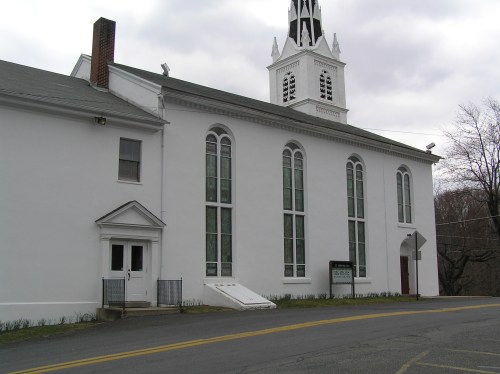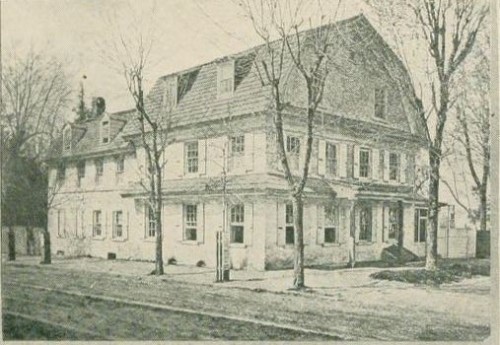This is a follow up to my previous blog post about my Delaplaine/Dilliplane ancestors & information about them gleaned from church records. The focus of this post is my 5x great-grandfather Joshua Delaplane.
My ancestor Joshua Delaplaine was likely born in Germantown, Philadelphia County, Pennsylvania circa 1707. His parents, James and Hannah, were prominent in the community and respected members of the Society of Friends (Quakers). Joshua and his siblings were educated at the Germantown Friends School and brought up as Quakers as well. On a side note, it is interesting that in his will, Joshua’s occupation is listed as weaver. According the the website http://www.meetinghouse.info, Germantown was known for producing high-quality linens with the textile industry in that town dating back to the original settlers.
The first church record that I have found for Joshua is an 30th day 11th month 1737 [30 January 1738] entry in the Abington, Pennsylvania Quaker monthly meeting records. It is a complaint against Joshua Delaplane “for marrying contrary to the Rules of the Society.” In other words, he married a woman who was not a Quaker. In the minutes of the meeting the following month he “made acknowledgement of his outgoing in marriage to the satisfaction of the Meeting.” So he appears to have made peace with the Quakers, and they have accepted his marriage so long as he follows Quaker doctrine moving forward. Unfortunately, these records do not name his wife nor do they provide any further information regarding her family or her religious affiliation.
The next church record that mentions Joshua is a December 28, 1751 group baptism record for his wife Maria and children Joshua (age 12), John (age 10), Joseph (age 7) and Hannah (age 1). The baptism is recorded at Augustus Lutheran Church in Trappe, (now Montgomery County), PA. At the time Maria was seriously ill and was said to be on her death bed. Her husband Joshua was described in the record as an English Quaker. Despite the dire nature of her health Maria apparently did recover and have at least two more children. The records of New Hanover Lutheran Church (in current day Gilbertsville, Montgomery County) have a March 9, 1753 baptism for a son James who was born January 16, 1753. And St. Joseph’s Hill Church in Pike Township, (now Berks County) have an October 3, 1756 baptism for son Jeremiah who was born September 10, 1756.
The last set of church records mentioning Joshua (that I’ve found up to this point) are set of entries in the Exeter, (present day Berks County), Pennsylvania Monthly Meeting notes dated from 28th day 4th month 1757 [28 Jun 1757] to 31st day 8th month 1758 [31 Oct 1758]. According to these records, a certificate was sent from Abington Monthly Meeting transferring Joshua’s membership to Exeter Monthly Meeting. But Joshua never started attending meetings in Exeter. There were also accusations recorded in the Exeter Monthly Meeting notes stating that Joshua’s conduct was “reproachful,” that “he often used wild unseemly expressions,” and “that his children have lately been sprinkled by a priest.” (The sprinkling, of course, refers to the baptisms.) Joshua told the Exeter Friends who were sent to speak to him that “he knew of the Certificate’s being come, but that Abington Friends having used him ill in refusing him some assistance when his Family were much indisposed and in want” and that he “would not come to Meeting here until he had spoke with them.” He indicated that he may start coming to the Exeter meetings if he got some satisfaction from the Abington Friends. Apparently that never happened and testimony was read against him and he was officially disowned by the Quakers in 1758.
So what can we make of all this? Well, first, just a bit of general information about Quaker Meetings (as I understand it). There is a hierarchical organization to the Meetings with Preparatory Meetings feeding into Monthly Meetings, feeding into Quarterly Meetings, feeding into Yearly Meetings. At each level the geographic area becomes larger, with Preparatory Meetings being the most local. Monthly Meetings, however, is where most of the business is conducted and where membership certificates are held. If you move out of the jurisdiction of a monthly meeting, a certificate is sent to the monthly meeting that encompasses your new place of residence.
Going back to the marriage reference, it was in the Abington monthly meeting notes where that was mentioned. I have found several references that point to Germantown being part of the Abington Monthly Meeting. So it is conceivable that Joshua was still living in Germantown at his parents home when he married in late 1737 or early 1738. Joshua’s wife is supposed to be Maria Shelar or Shela according to the Delaplanes of America book – but I have not found any sources to support that being her surname. Based on this record, it seems like the Germantown area would be the best place to look for her family.
It also seems logical that when Joshua says that the Abington Friends refused to assist him when his family was indisposed and in want, he could be referring to the time in late 1751, when his wife Maria was seriously ill and said to be on her death bed. This coincides with the group baptism of Maria and the children. Although Joshua himself was not baptized, he may have “permitted” his wife and children to receive the sacrament because of his disenchantment with the Quakers for not helping him during this time. This is purely speculation unless further records can be found. This could also be about the time the family moved out of Germantown, particularly with James being baptized at New Hanover Lutheran Church in 1753 and Jeremiah at Hill Church in Pike township three years later. The Quakers just may not have tried to transfer his certificate right away. It is probably worth double checking the Abington Monthly Meeting notes to see if they contain any additional information.
I was actually thrilled to find this set of records. Joshua strikes me as a feisty man who was doing his best to support his wife. Maria apparently had no desire to become a Quaker, and Joshua was left to find a balance between his Quaker upbringing and her beliefs. He appears to have succeeded for a while. But then he perceived the Quakers abandoned him when he needed their support and that became the game changer for him.








